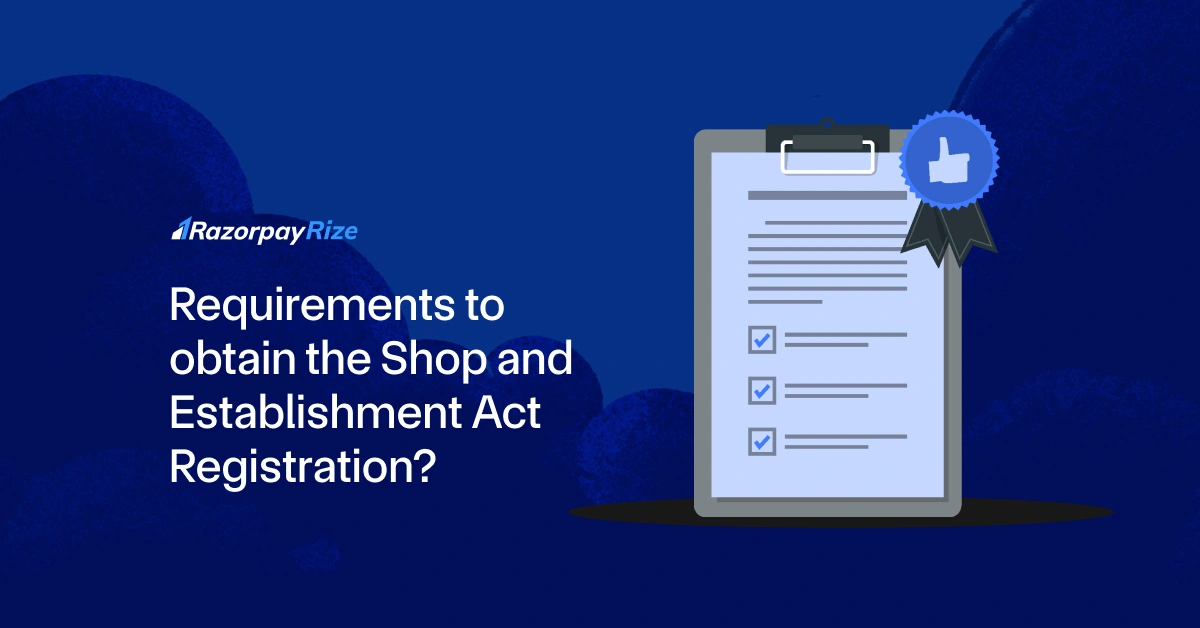If you run a food business in Delhi- whether it’s a small home kitchen, a café, a packaged food brand, or a large restaurant chain- FSSAI registration is mandatory under the Food Safety and Standards Act (FSS Act), 2006. It ensures that the food you produce, store, or sell meets safety and hygiene standards.
Having an FSSAI license not only builds consumer trust but also protects your business from legal penalties. In this guide, we break down the types of permits, eligibility requirements, documents needed, fees, renewal steps, and the complete registration process in Delhi.
Table of Contents
What is FSSAI Registration?
FSSAI Registration is a legal authorisation issued by the Food Safety and Standards Authority of India (FSSAI). It ensures that food businesses comply with safety, hygiene, and quality standards before selling food products to consumers.
Every food-related business is required to obtain an FSSAI license, which is accompanied by a unique 14-digit registration number. This number must be displayed on food packaging and premises, helping regulators and consumers trace the food supply chain.
Types of FSSAI Registration
The FSSAI offers three types of food licenses, depending on the business's size, turnover, and scale of operations. These include:
- FSSAI Basic Registration
- FSSAI State License
- FSSAI Central License
Below is a brief overview of each.
FSSAI Basic Registration
Basic Registration is meant for small-scale food businesses with an annual turnover of up to ₹12 lakh. Typical applicants include:
- Small street food vendors
- Home-based food units
- Petty retailers
- Small wholesalers or traders
This is the most straightforward and most affordable registration level for micro food businesses.
FSSAI State License
The State License applies to medium-sized businesses with a turnover between ₹12 lakh and ₹20 crore. Examples include:
- Medium-sized restaurants
- Mid-level distributors or wholesalers
- Small-to-medium food manufacturers
- Storage units, packers, and transporters
This license is issued by the State Department of Food Safety.
FSSAI Central License
The Central License is for:
- Large businesses with a turnover above ₹20 crore
- Food businesses operating in multiple states
- Importers and exporters
- 100% Export Oriented Units (EOUs)
- Large manufacturers and processing units
Central Licenses are issued by the FSSAI Central Authority.
Key Benefits of FSSAI Registration in Delhi
Obtaining FSSAI registration in Delhi offers several advantages:
- Builds customer trust by showing that food meets safety standards
- Enhances business credibility in a competitive Delhi market
- Ensures legal compliance, avoiding penalties or shutdowns
- Improves food quality control through standardised processes
- Enables business expansion, as many marketplaces and aggregators require an FSSAI license
- Strengthens brand reputation and attracts more consumers
Eligibility Criteria for FSSAI Registration in Delhi
Eligibility depends on turnover and the nature of the food business.
Basic Registration (Turnover up to ₹12 lakh):
- Small vendors, hawkers, petty retailers
- Home kitchens, cottage industries
- Small storage or transport units
State License (Turnover ₹12 lakh – ₹20 crore):
- Medium-sized restaurants and cloud kitchens
- Mid-level manufacturers and packers
- Storage units exceeding a certain capacity
- Transporters with 100+ vehicles
Central License (Turnover above ₹20 crore or multi-state operations):
- Large manufacturers and processing units
- Importers, exporters, and e-commerce food sellers
- Businesses supplying to government departments
- Operators across multiple states
Documents Needed for FSSAI Registration in Delhi
The documents vary by license type, but the standard requirements include:
- Passport-size photos of the applicant
- Identity proof (Aadhaar, PAN, Voter ID)
- Proof of business premises (rent agreement, electricity bill)
- Business registration documents (Partnership Deed, GST, Incorporation Certificate)
- Layout plan of the food processing/handling area
- Food Safety Management System (FSMS) plan
- List of food items/products to be handled
- Water quality report (for manufacturers)
- NOC from the municipal body (if applicable)
How to Apply for an FSSAI License in Delhi – Step-by-Step Process
Follow these steps to apply for FSSAI registration in Delhi:
- Visit the FoSCoS portal (Food Safety Compliance System).
- Choose your license type based on turnover and business category.
- Create a user account and log in.
- Fill out the application form (Form A for Basic, Form B for State/Central).
- Upload required documents, including identity proofs, premise documents, layout, and FSMS plan.
- Pay the applicable fee online.
- Application verification by the food safety department (may involve inspection).
- Download your 14-digit FSSAI certificate once approved.
FSSAI Registration Fees in Delhi
FSSAI registration fees vary based on the license type:
- Basic Registration: Lowest fee (for small units up to ₹12 lakh turnover)
- State License: Moderate fee based on business category and capacity
- Central License: Higher fee for large-scale businesses or multi-state operations
Exact amounts may change as per Delhi's state authority norms.
FSSAI Certificate Renewal in Delhi
FSSAI licenses are valid for 1 to 5 years. Businesses must apply for FSSAI renewal at least 30 days before expiry to avoid penalties.
Renewal process:
- Log in to the FoSCoS portal
- Select “Renew License/Registration”
- Upload updated documents
- Pay renewal fees
- Complete inspection (if required)
- Download the renewed certificate
Why FSSAI License Matters for Food Businesses in Delhi
An FSSAI license is vital for any Delhi-based food business because it:
- Ensures food safety compliance
- Builds customer trust in a competitive market
- Helps avoid fines and legal issues
- Enhances brand reputation and market credibility
- Enables expansion to online platforms, delivery apps, and retail chains
- Ensures smooth business operations with government and private institutions
Frequently Asked Questions (FAQs)
Private Limited Company
(Pvt. Ltd.)
- Service-based businesses
- Businesses looking to issue shares
- Businesses seeking investment through equity-based funding
Limited Liability Partnership
(LLP)
- Professional services
- Firms seeking any capital contribution from Partners
- Firms sharing resources with limited liability
One Person Company
(OPC)
- Freelancers, Small-scale businesses
- Businesses looking for minimal compliance
- Businesses looking for single-ownership
Private Limited Company
(Pvt. Ltd.)
- Service-based businesses
- Businesses looking to issue shares
- Businesses seeking investment through equity-based funding
One Person Company
(OPC)
- Freelancers, Small-scale businesses
- Businesses looking for minimal compliance
- Businesses looking for single-ownership
Private Limited Company
(Pvt. Ltd.)
- Service-based businesses
- Businesses looking to issue shares
- Businesses seeking investment through equity-based funding
Limited Liability Partnership
(LLP)
- Professional services
- Firms seeking any capital contribution from Partners
- Firms sharing resources with limited liability
Frequently Asked Questions
Who needs FSSAI registration in Delhi?
Any business involved in handling, preparing, processing, storing, transporting, distributing, or selling food must obtain an FSSAI registration or license. This includes:
- Home kitchens and tiffin services
- Restaurants, cafés, bakeries, and cloud kitchens
- Food manufacturers and processors
- Retailers, wholesalers, and distributors
- Food trucks, street vendors, and hawkers
- Importers, exporters, and e-commerce food sellers
- Storage units, packers, and transporters
If the business deals with food at any stage, FSSAI registration is mandatory.
What is the validity of the FSSAI license?
An FSSAI registration or license is valid for 1 to 5 years, based on the duration selected at the time of application. Businesses must apply for renewal at least 30 days before expiry.
How can small food vendors apply for FSSAI registration?
Small vendors with a turnover of up to ₹12 lakh can apply for FSSAI Basic Registration. They need to:
- Visit the FoSCoS portal
- Fill Form A online
- Upload basic documents (ID proof, address proof, business details)
- Pay a small registration fee
- Wait for verification or inspection (if required)
Once approved, they receive the 14-digit FSSAI registration number.
What happens if a business operates without an FSSAI license?
Operating without an FSSAI license is a legal offence under the FSS Act, 2006. Consequences include:
- Penalties up to ₹5 lakh
- Orders to stop operations
- Product seizure
- Legal action for food safety violations
How long does it take to get the FSSAI license in Delhi?
The processing time depends on the license type:
- Basic Registration: 7–10 days
- State License: 15–30 days
- Central License: 30–60 days
If an inspection is required, the timeline may be extended slightly.
















